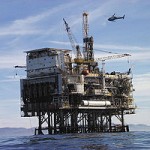by Catherine Haug
Two years ago, gas was over $4/gallon; it won’t be many years before it reaches $10 or even $20/gallon, as demand rises against declining supplies. And it isn’t just the gasoline that would be costly; everything that depends on petroleum or the power it generates will be more expensive: the cost of generating power to mine and refine the steel, aluminum and other metals; to create the plastic and vinyl; and to operate the robots that assemble the cars. Even to build those robots.
So a car that sells for $25,000 today, would cost at least $75,000 when gas is $10/gallon; $200,000 when gas is $20/gallon. Who could afford that, even if the cars are twice as fuel efficient as they are today? Especially if you had to pay 3-times as much for your groceries and utilities that are also dependent upon the cost of gas. [Cost projections are my own best guess].
And then there’s the cost of asphalt or concrete for all the new and rebuilt roads. Asphalt is made from petroleum, so its cost would also rise, as well as the cost to manufacture and lay the concrete. Of course, with rail, there would be the cost to build/rebuild the tracks that must be considered, so it has to be planned smartly.

Portland Streetcar
So why not imagine and plan now, to be ready with an alternative when we can no longer afford cars and highways.
The Case for Rail
(photo from portlandstreetcar.org; see also Portland Streetcar for more)
The AARP Bulletin for April 2010 features an article on “Streetcar Revival” for urban communities. The online version of the article does not feature the cityscape photo that accompanies the paper version, a scene familiar to my eyes because I used to live in that cityscape: Portland, Oregon. An example held as the standard for modern, efficient mass transit in urban areas. (more…)


